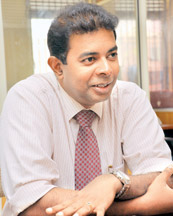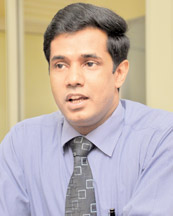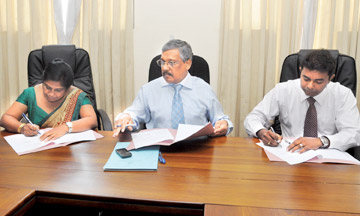Will Ayurveda and Western medicine link?
By Dhaneshi Yatawara
|

Prof. Sisira Siribaddana.
Pix: Susantha Wijegunasekara
|
Medicine has its own limits. The speed at which the world is growing
or the level of sophistication in modern technology can increase with
time, but there still remains a faction in modern medicine where it
cannot go beyond reality.
In Sri Lanka we have heard many stories of miracles in ayurveda and
western medicine where the doctors would go in to new approaches for the
betterment of patients. We hardly see an integrated approach among the
medical professionals though Sri Lanka owns indigenous medicines that
have existed for thousands of years and many other ancient medical
practices which we today call with technical term 'complementary and
alternative medicine'. In order to find out the best that can be gained
with using both the modern medicine as well as complementary and
alternative medicine making a healthy nation with these valuable
resource that we have in hand, a group of medical professionals from
both these segments are creating a common ground to experiment. The
Medical Faculty of Rajarata University and the Ministry of Indigenous
Medicine are getting together to research on how to use both medical
fundamentals to establish a better healthcare facility.
"Our target is to improve the primary healthcare facilities in the
country, said Dr. Senaka Pilapitiya of the Rajarata University
explaining on the agreement.
This year the Ministry of Indigenous Medicine has given more focus on
to researches, according to ministry secretary Lalith Kannangara. "This
year through the Government budget we are getting around 300 million
rupees for the ayurvedic researches," Kannangara said. "Thus, we hope
that this program will support our targets too," he added.
"Our traditional ayurvedic practitioners are doing a great job
especially at village level. Ayurvedic practitioners who are working as
Community Healthcare Officers are doing a great job. But the recognition
is less. Through the new program with the Rajarata University we are
hoping that the immense work contributed to the community by our
community health officers will get due recognition," Kannangara added.
As Kannangara explained, through this project the ministry wants to
get the best of the service of the medical practitioners to the people
of the area.
 |
|
Dr. Senaka Pilapitiya |
According to Prof. Sisira Siribaddana of the medical faculty,
Rajarata University, this new approach is to educate these community
health workers with capacity building. "We equipping them with new
skills enabling them to provide a better service to their communities
through their own medical fundamentals," Prof. Siribaddana said.
|

Dr. Suneth Angampodi |
This will be a benchmark for the two medicinal approaches, said
Kannangara. "We are also looking in to new intergrated approaches in
medicine and the western medicine is also looking in to this. So this
will be a turning point in the history," Kannangara said.
If we successfully carry out for three years we can see a special
system where western medicine as well as CAM that could be used
effectively in community settings like Sri Lanka where such medical
fundamentals are commonly practised. And then we can evaluate and assess
to see how this could be used in overall healthcare system.
"So far even in the rest of the world there aren't many examples to
learn how both of these worlds could be used to heal a community. The
World Health Organisation is promoting and have recognised the CAM
practices for the benefit of patients. So this will be a great
opportunity to turn new chapter," Dr. Pilapitiya said.
"Complementary and Alternative Medicine (CAM) is a broad
categorisation of systems of Medicine that do not conform to the
standards and practices of Allopathic medicine (Conventional medicine)
which is universally recognised as the accepted point of reference for
medicine in modern science," said Dr. Pilapitiya.
"As these systems are practised in preventing or treating illness and
promoting health and well-being of people, WHO has recognised these
systems as a part of health care delivery to the world community and had
set guidelines in using them and also in further research,"he said.
|

Signing the agreement - Secretary, Ministry of Indeginous
Medicine Lalith Kannangara (centre) |
As he further said there is increased investment in herbal medicine
and CAM research by public-health bodies in many countries. China,
India, Nigeria, the United States of America and WHO have all made
substantial research investments in traditional herbal medicines.
"Different entities may view the social value of CAM research
differently. Public-health entities may be concerned with defining the
risks and benefits of herbal medicines already in use, he said.
"There are programs running in other countries that are experimenting
on cures to ailments using these fundamentals. But using these knowledge
to raise the primary healthcare at community level is hard to find even
in global context," said Dr. Suneth Angampodi of the Rajarata
University.
As he further said health issues in the communities at large such as
malnutrition can be well addressed by promoting the Ayurveda lifestyle.
The problem in continuing such studies is the lack of data on
Complementary and Alternative medicinal practices, according to Dr.
Angampodi. "We need statistics to prove the effectiveness of medical
practices as it is important to present this internationally as well. In
order to convince the global medical sector we need to adhere to the
standards established," he said.
This will be a platform that would let the Sri Lankan healthcare
sector learn how to proceed in to the new fast moving world in an
innovative approach. |



